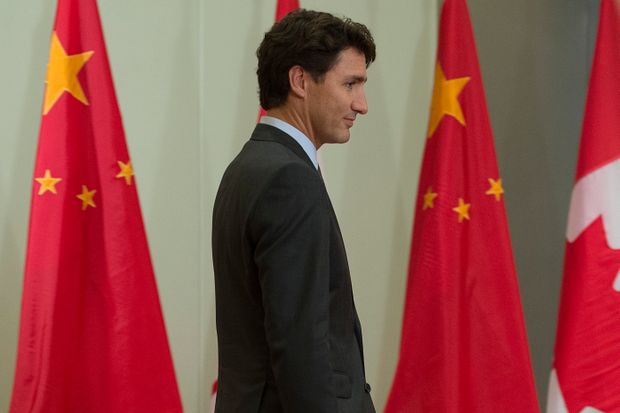Canada needs ’reality check’ on trade ambitions with China: report

National Post | 28 March 2019
Canada needs ’reality check’ on trade ambitions with China: report
OTTAWA — Canada needs a “reality check” in its approach to free trade with China, particularly amid a dispute over canola exports that points to deeper-lying contradictions in Chinese trade policy, a new report warns.
In a report Thursday, the Macdonald-Laurier Institute lays out a comprehensive argument against Canada seeking a trade agreement with China, saying it would be a “non-starter” because of the fundamental disagreement between the two countries over basic market principles and international trade law.
MLI senior fellow Duanjie Chen reviewed a number of free trade deals China has signed in recent years with other nations, including Switzerland, New Zealand, Pakistan, and found a “troubling pattern of [the deals] benefiting China more than its partners,” according to the report. Chen found that China has been “a much shrewder negotiator in getting what it wants from its partners, all of whom have regarded China’s non-market system as harmless.”
The report comes after warnings from intelligence experts that China’s increasingly aggressive geopolitical positioning puts it at odds with Western powers, particularly when it comes to inking free trade agreements. It also points to the lopsided trade rules by which China abides, typically by gaining better access abroad for its state-owned enterprises (SOEs), all while maintaining tight restrictions on investments in Chinese assets.
Ottawa’s plans for a trade agreement have cooled since Canada arrested Huawei Technologies Co. Ltd. executive Meng Wanzhou at the request of U.S. authorities, prompting a months-long diplomatic spat with China. China has also detained two Canadian citizens, citing vague national security reasons.
On Tuesday, China further escalated tensions when it barred imports of canola from Canadian firm Viterra Inc., a unit of Switzerland-based Glencor Plc. The move came after a similar ban this month on imports from Richardson International Ltd., a major seller of Canadian grains and oilseeds.
Both bans cited “harmful organisms” found in canola shipments to China; no other Canadian trading partner has made similar claims.
Canada exports roughly 90 per cent of its canola, and sold $2.7 billion worth of the commodity to China in 2018.
Prime Minister Justin Trudeau has mulled sending a delegation to China in a bid to reverse the canola bans — a plan some critics say fails to recognize the depth of the differences between the two nations.
“It will simply be humiliating for Canada, and give the Chinese a pretext to further their pressure on Canada,” said Charles Burton, professor at Brock University and former counsellor at the Canadian embassy to China.
“The idea that the prime minister could send a delegation to China and reason with them, that their claims about the purity of our canola shipments are unfounded, is ridiculous,” he said. Burton is also a senior fellow at MLI.
In her report, Chen said a free trade agreement with China would likely involve reducing barriers for Chinese state-owned enterprises (SOEs) to acquire assets in Canada.
China in particular is looking to reduce a threshold set by the Harper government that automatically triggers a review of proposed acquisitions by SOEs when they go over a certain price. The threshold was introduced after Chinese oil giant CNOOC Ltd. acquired Canadian oilsands firm Nexen Energy Inc. in 2012 for $15.1 billion, part of a widespread push by China to buy natural resources assets abroad. That push set off national security concerns in Canada, Australia and elsewhere.
Chinese SOEs have long been known to use their clout to further the broader ambitions of the Communist Party of China. The proposed takeover of Canadian construction firm Aecon Group Inc. by a Chinese SOE was ultimately struck down last year by Ottawa, which cited national security concerns.
Chen also reviewed a number of trade pacts China has signed in recent years, and found that they overwhelmingly favour the world’s second-largest economic power.
Switzerland, for example, removed tariffs on 99 per cent of its products on day one of signing an agreement with China, while China agreed to remove only a portion of its import tariffs over a period of five to 15 years.
In its trade deal with Australia, China managed win full protections for both established and new investments it made, while Australia’s protections apply only to established investments.
In all of its free trade deals, China agrees to protections on private ownership of assets, which creates lopsided incentives in China’s mostly state-owned land system.
“This fundamental discrepancy in land ownership implicitly motivates Chinese investors to grab land abroad but deters their counterparts from doing the same in China,” the report said.
In 2017, Canada’s trade deficit with China reached $44 billion, the highest on record. Raw commodities make up the largest share of exports into China, while equipment and machinery exports are just nine per cent, due in part to protections the Chinese government has placed on its manufacturing sector.





